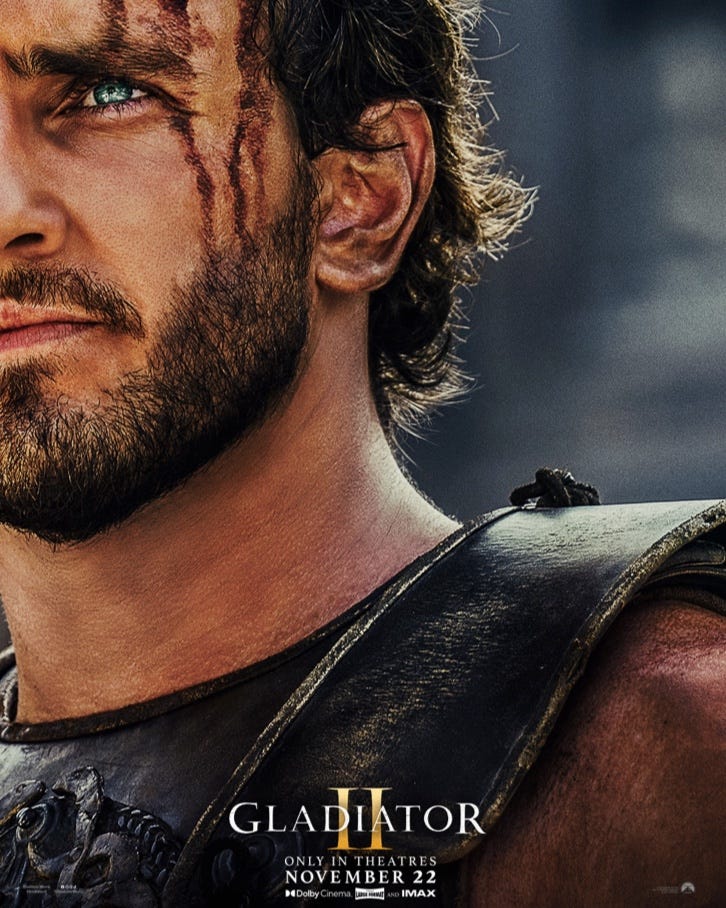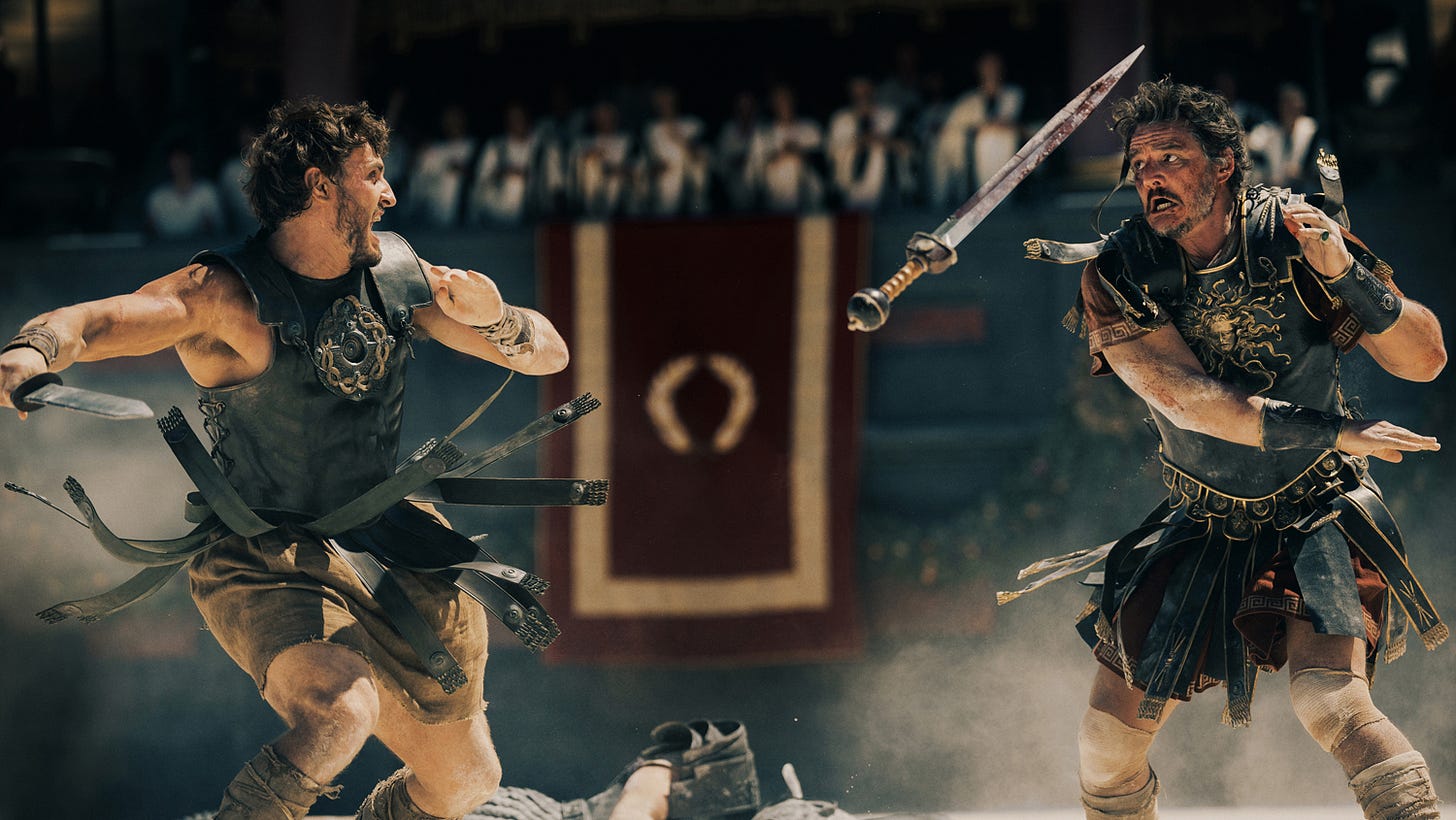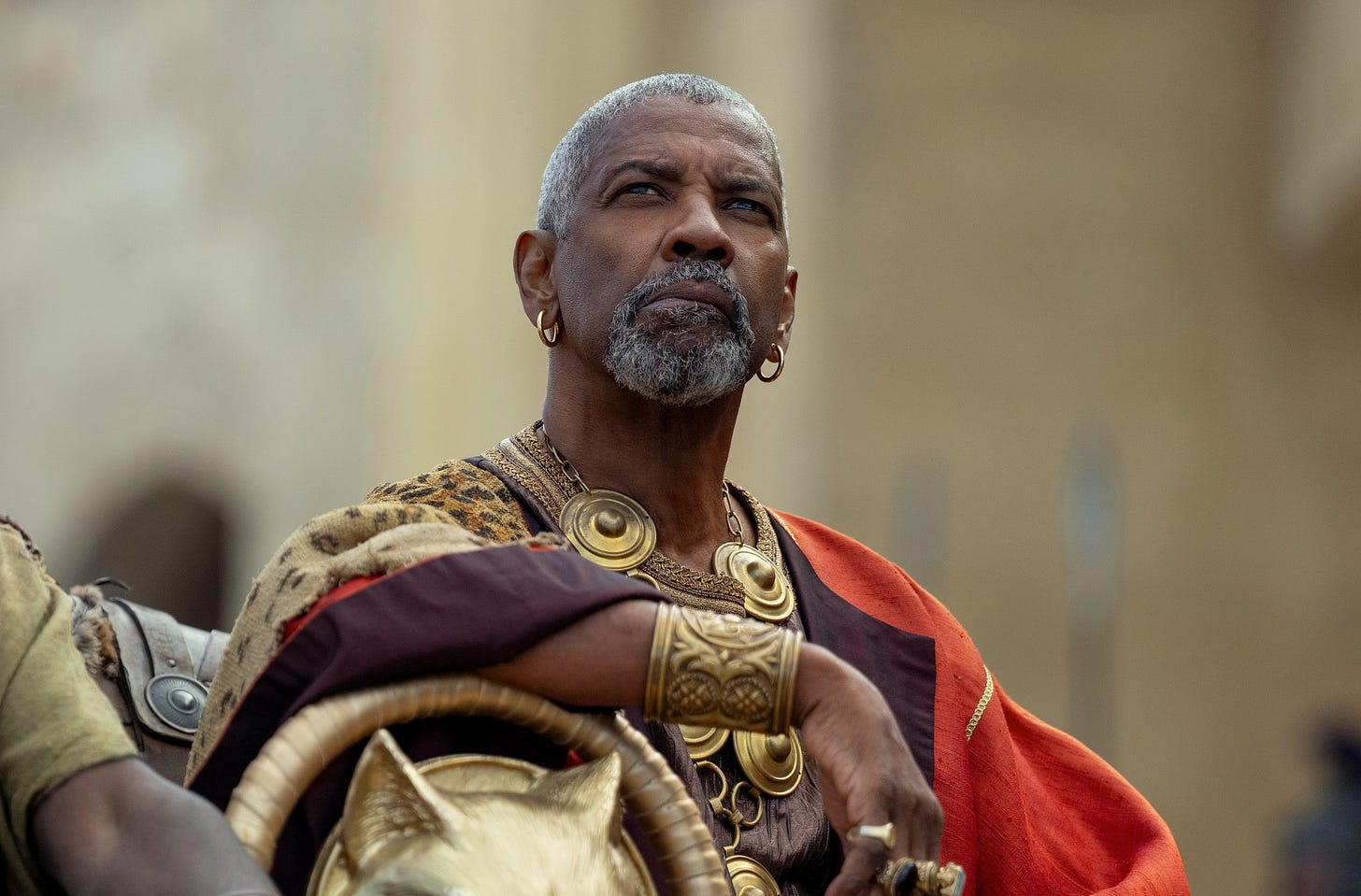Gladiator II: A Rome Worth Fighting For
Ridley Scott returns to the Roman Coliseum. Is revenge just as delicious the second time around?
I’ve become familiar with the feeling of sitting in a theater and asking myself what I am expecting. The first time I can remember doing this was back in 2011. My summer baseball team had finished up tournament game and we dragged our sweaty bodies into the theater to see Captain America: The First Avenger. I was a Marvel fan then, and I still am now, but nothing about Captain America seemed all that interesting to me. This has happened more than a dozen times since then. Perhaps it comes wit the territory. If you go to movie screenings, you may find yourself in a position of curiosity. For Gladiator 2 those feelings crept back up as I found my seat. Ridley Scott isn't an obscure name, in any stretch of phrasing, but I have found his more recent work to be lacking…gravitas…perhaps. And there, in the cinema seat, I found myself pandering the necessity of a sequel to 1999’s Gladiator.
The first film isn't perfect, but it also doesn't beg the question, “what happens next?” Maximus Decimus Meridius fulfills his mission, succumbs to his injuries, and we see him reunited with his family. The future of Rome feels secure, the masses having witnessed the deposition of a despotic tyrant in Commodus on Rome’s largest stage. The sequel immediately begged the question, how could this possibly happen again? What leader would allow the meteoric rise to popular acclaim Maximus garnered? How? Just, how?
The film itself seems content to largely ignore this question, and while I may have enjoyed an explanation, the lack thereof does allude to something I believe falls in line for Ridley’s vision of Rome/America on display here. Gladiator II takes place 16 years after the events of the first film. In 200 A.D. 16 years is a full generation, more or less. As our country reels from the re-election of Emperor Palpatine, albeit an increasingly less capable Sheev, the Rome of Gladiator II feels shockingly familiar. The Roman Legion is carrying out colonial violence on an endless trajectory, the people are lazy, debaucherous, underpaid, and increasingly given to displays of violence, and the emperors, Geta and Caracalla are inept, cruel, corrupt, and incompetent. The whole of Rome is portrayed as this bog of filth. There is perhaps a critique here of the consistent portrayal of queer and queer adjacent servants and concubines, but at the same time, I have come to understand the hoi oligoi of the Latin world. It is never reproached or discussed, it merely exists, and because of this, I was never made uncomfortable by what could be seen as a suggestion of their existence as degeneracy. Though I must be clear, It doesn't exonerate the film from doing so.
The story is easy enough to grasp. Hanno (Paul Mescal) is a Numidian farmer and warrior forced to defend his city from the inexorable Roman colonial army. His wife Arishat (Yuval Gonen) is an archer. When the Romans, led by Marcus Acacius (Pedro Pascal), attack Numidia, Arishat falls and Hanno is captured. From this epilogue, Gladiator II very much follows in the footprints of its predecessor. It’s palatable. Familiar. From slave to unknown Gladiator, from unknown Gladiator to darling of the hoi polloi. Denzel Washingtons Macrinus stands in the shoes of the ineffable Oliver Stone. Stone’s Proximo in the first film, served as Maximus’s keystone to the Roman Coliseum. Macrinus shares this purpose in Gladiator II, but this time with motivations of his own. Macrinus has eyes for a seat of power in the crumbling Roman government, a government grown ineffectual and corrupt in the time since we last saw them.
With this baseline established Gladiator II gallops into acts two and three. Scott doesn’t get bogged down with exposition as this film traverses its parts. WE know how this is going to work out mostly. When Gladiator II is paying homage and mimicking its predecessor, it sings. This isn't to say when it tries to distinguish itself it falters, rather, the concept executed by Scott allows Gladiator II to take some swings at unbroken ground and fall back unto its patterned revenge tale as a means of stabilization. It’s the concept of “meanwhile back at the ranch” without any truly divergent storylines. As a film it largely fails the “and then” test. In fact, most of the plot points are connected by “and then” statements. This lends to the steady and escalating pace. The few actions punctuated by “but” and “therefore” are relatively easily predicted: A spy overhearing a sensitive conversation, a drastic action forcing things into motion. But despite this, I didn't find these things detrimental to the pathos of film. This is a revenge story. Just as the first Gladiator was. The reason is different, but only slightly. And I didn't care.
Paul Mescal is an absolute force to be reckoned with, throughout the movie. He isn't Russel Crowe’s Maximus, though I am afraid there was never really an opportunity for Crowe’s performance to be eclipsed. Mescal’s Hanno is a story in parallel, not seeking to supplant or depose the former story, but instead to serve as a reminder to those in power. A reminder of the fragility of their control. Rome’s predilection for violence leaves itself open for history to repeat itself. Denzel Washington is fantastic and hideous. Usurping and upsetting expectations and chewing the scenery up every moment the camera gives him a spotlight. Pedro Pascal’s deeply conflicted Acacius serves as an excellent foil to Mescal, and is perhaps the only secondary storyline the film can jump to when the core story reaches moments of respite. Fred Hechinger and Joseph Quinn’s Emperors Caracalla and Geta, respectively, are repulsive and chaotic creatures. Each of them capable of causing differing feelings of anxiety and rage. But it is Alexander Karim’s Ravi, the gladiator’s doctor, who steals the show for me. In a film of large and loud personalities, Ravi is a gentle and quiet pacifist, and serves as Hanno’s conscience, even when he would rather ignore it.
Altogether Gladiator II ends up, for me, feeling like more of the same. But “the same” in this case, is one of the best revenge stories put to film in the last forty years. And what’s more, as the ending rapidly approaches I realized Ridley Scott was going to choose hope over drama, which might constitute me giving too much away. Still, I think it is worth pointing out. In a landscape as dire as our own, and certainly in the case of the Rome portrayed, the option to choose hope is an act of resistance. And it’s a choice I am extremely grateful for. The action is bloody and relentless, the politics are deceptive and intriguing, but most importantly the vengeance is just and meted out justly. I only wish Hans Zimmer had been available to score this time, because while Harry Gregson-Williams is fantastic, I can only assume they stayed away from the original Gladiator theme because they didn't want to overuse another composer’s work (rights issues not included). But by god when the theme does play is it a punch right in the throat.
If you liked the first Gladiator you are going to like this sequel. It is exactly what I wanted 24 years later. A revisiting not a reinterpretation. A refrain not a bridge. “Where we go, death is not. Where death goes, we are not.” Follows perfectly the words of Maximus, “What we do in life, echoes in eternity.” Well done Ridley Scott. Now go make a good Alien movie again.







